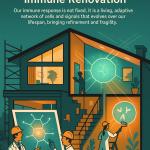This is the tenth anniversary of my diagnosis with prostate cancer. I suppose the more clickable way to express that thought is that ten years ago, I began my journey as a prostate cancer survivor.
Disease
In an era where it seems like our country can’t agree on much, cancer remains an outlier of an issue.
A new study explores this intricate journey, revealing that immune aging is not merely a process of decline but a complex recalibration that begins long before overt immune weakness appears.
From Fading Sight to Map-Like Scars: Geographic Atrophy
"With the wrong metaphor we are deluded; with no metaphor we are blind."
- Jonathan Haidt, The Happiness Hypothesis
RFK Jr. has been yelling about the causes of ASD for years. Of course, there’s his pet, debunked theory about vaccines and autism that he’s been busy pushing into policy.
Addiction as a Chronic Illness: Rethinking Recovery
In the last few years, the treatment of obesity has undergone a seismic shift. For decades, bariatric surgery stood as the most effective and durable intervention we had for severe obesity.
Join Cameron English and Dr. Chuck Dinerstein on Episode 135 of the Science Dispatch podcast as they discuss:












